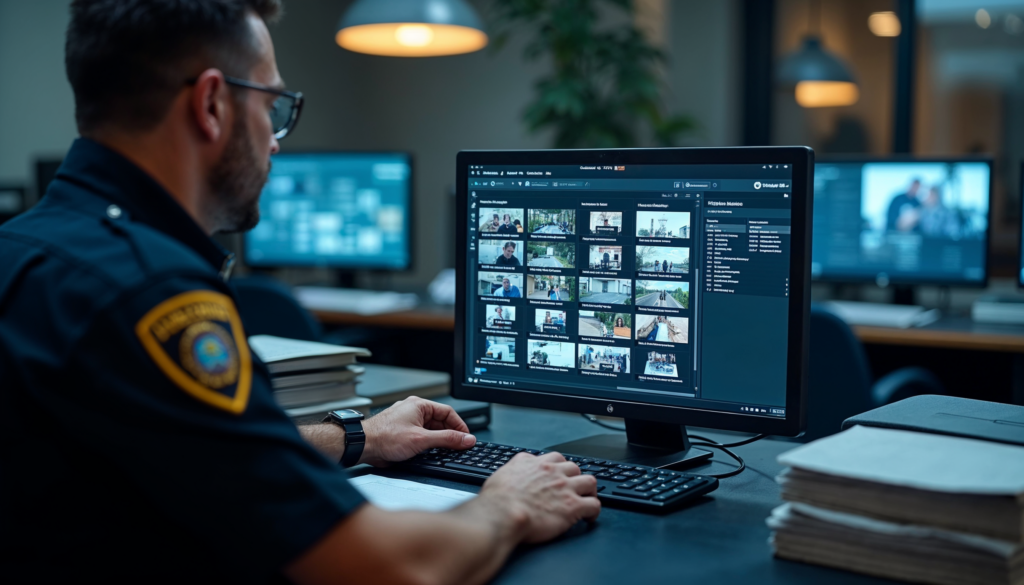The Future of Justice: Using AI for Prosecution and Enhancing Case Efficiency
By Rafay Muneer on December 23, 2025, ref:

Learn about the importance of AI in the future of justice. Discover how AI for prosecution can enhance case proceedings and legal efficiency.
AI is transforming the future of justice, enabling legal teams to close cases faster, reduce errors, and focus on delivering justice efficiently. To ensure increased public safety and enhance the justice system, prosecutors must start using AI for prosecution.
The justice system is slow. If you’re a prosecutor or district attorney, you’ve likely felt the frustration of cases dragging on for months—or even years. Meanwhile, the backlog keeps growing, victims wait for resolution, and the costs of lawsuits soar.
Justice delayed is justice denied. For prosecutors and law enforcement, case backlogs are more than an inconvenience—they’re a direct threat to the very fabric of a fair legal system. Every delay means victims waiting longer for closure and suspects stuck in limbo, while the mountain of unsorted digital evidence continues to grow.
What if there were a way to change this? What if you could streamline case and evidence analysis, reduce manual work, and close cases faster, without compromising on the quality of justice? This is where AI for prosecution comes in. It’s not just a buzzword; it’s a real solution reshaping how legal teams operate.
Case Backlog Challenges: What Causes the Need for AI in Criminal Justice?
The criminal justice system is overwhelmed. Caseloads are increasing, but resources to handle them remain stagnant. Prosecutors face an uphill battle regarding evidence analysis, document review, and case preparation. The process is long, tedious, and filled with manual tasks that consume valuable time.
The delay is more than just a minor inconvenience for district attorneys and prosecutors. It’s like a ticking time bomb. The longer the cases sit unresolved, the harder it becomes to maintain a smooth workflow. Victims, defendants, and society pay the price.
Upon that, the bigger problem? Time.
Time can be lost in evidence processing, courtroom delays, and navigating heaps of case documents. This inefficiency doesn't just frustrate legal teams—it hampers justice.
Picture this. You’re a prosecutor on a high-stakes criminal case. You receive hundreds of hours of surveillance footage, dozens of witness interviews, and countless pieces of digital correspondence. Your team is overworked, your resources stretched thin, and there’s no clear way to process this data and make your case quickly. It’s a common scenario across many prosecution offices worldwide because time is your worst enemy. This solidifies the need to use AI for prosecution systems.
Without the right tools, managing the complexities of digital evidence can feel like pushing a boulder uphill. The sheer volume of data, combined with the need for accuracy and speed, is enough to overwhelm even the most seasoned prosecutors. Hence, all these factors fuel the need to utilize AI for prosecution, enhancing the delivery of justice.
The True Cost of Delay: When AI in Prosecution Systems is not Utilized
Let’s not sugarcoat it—when cases drag on, everyone loses. For prosecutors, the growing caseloads become unbearable, forcing them to juggle too many files at once. As a result, critical details slip through the cracks, evidence gets overlooked, and the opportunity to build strong cases diminishes. This increases the probability of mistakes, and the pressure to meet deadlines intensifies.
Such a balancing act between speed and quality becomes a constant struggle for district attorneys. You’re walking a fine line, trying to ensure justice is served while being forced to compromise on both ends.
Public defenders face a similar battle, often overwhelmed by a flood of cases and lacking the resources to give each one the attention it deserves. For instance, a study found that the Oklahoma DAs usually worked with nearly four times as many cases as they should have. They are highly overworked. Their clients, many of whom are waiting anxiously for their day in court, suffer the consequences of delays that could drastically impact their futures. Each stalled case not only weakens the defense and prosecution but also puts victims, defendants, and the public in a frustrating uncertainty, gradually eliminating their trust in the justice system. Hence, the need to use AI for prosecution is becoming crucial.
After all, how much longer can the justice system survive and operate under such circumstances?
At the end of the day, delays mean that justice isn’t being served efficiently. Although the intentions are noble, it’s not enough. Cases must move faster. Investigators need quicker insights. Prosecutors need more time to focus on strategy, not redaction or transcription. This can be done by harnessing the potential of AI for prosecution and an efficient justice system.
Leveraging AI for Prosecution: How AI Can Accelerate Case Preparation and Resolution
So, how does utilizing AI for prosecution increase the efficiency of case proceedings?
AI-driven tools are specifically designed to handle the heavy lifting of legal work. From evidence analysis to helping automate the review process, AI removes much manual labor from prosecution tasks, allowing legal teams to focus on what they do best, i.e., building strong cases and closing them quickly.
Here's how utilizing AI for prosecution can revolutionize case proceedings and enhance justice delivery:
1. Automated Evidence Analysis
One of the most time-consuming parts of building a strong case is analyzing evidence, whether it’s video footage, transcripts, or thousands of documents. Conventionally, this process involves skimming through everything manually. Using AI for prosecution can help you analyze these massive amounts of data in a fraction of the time. AI-powered tools identify faces appearing in video, categorize footage on activities being performed, and even flag inconsistencies that might be overlooked.
Imagine an AI that can watch hours of video footage and instantly highlight crucial moments, or review hundreds of pages of transcripts and pull out key pieces of testimony. The time savings are immense, and the accuracy is unmatched.
2. AI-Powered Redaction
Sensitive information often needs to be redacted from legal documents before they can be shared with defense attorneys or presented in court. This is an essential but tedious process that can take days to complete. Leveraging AI for prosecution can streamline this process by automatically identifying and redacting sensitive information from video and audio evidence, such as personally identifiable information (PII), medical records, or even specific details required by law.
Instead of manually scrubbing through hours of footage or listening to recordings, advanced AI systems can efficiently redact faces, license plates, voices, etc., with immense precision.
For example, legal teams can automate the redaction process with the help of automated redaction tools, ensuring compliance with regulations like GDPR and HIPAA while speeding up case proceedings.
3. Natural Language Processing for Transcripts
Manually transcribing and reviewing interview transcripts or courtroom testimonies is a tiring task. Utilizing AI for prosecution can automate this task and help you enhance efficiency. Advanced AI systems are based on Natural Language Processing (NLP) technology. NLP can transcribe audio files with high accuracy and quickly pull out relevant pieces of information for the legal team.
For prosecution teams, this means that instead of spending hours listening to recordings, AI delivers a searchable, comprehensive transcript almost instantly, allowing them to focus on strategy and case development.
Furthermore, using AI for prosecution can help you translate languages spoken in audio evidence. This ensures that no crucial evidence is overlooked due to language barriers. This capability comprehensively explains testimonies or conversations recorded in different languages for international cases or jurisdictions with diverse populations.
4. Data Organization and Case Prioritization
Another significant advantage of using for prosecution is that it can organize and prioritize data as per your needs. Legal cases often involve overwhelming amounts of information—witness statements, police reports, medical records, etc. AI helps search through this unstructured data meaningfully, allowing prosecutors to identify key evidence and decide how to prioritize their cases quickly.
Leveraging AI for prosecution helps manage workflows for district attorneys to ensure that the most critical cases are handled first. It provides the right insights at the right time, making sure that no case falls through the cracks.
5. Enhanced Collaboration Across Teams
An AI-powered tool for case management allows for smooth collaboration between law enforcement, prosecutors, and courtroom administrators. This is because evidence, case notes, and court documents can be securely shared, edited, and reviewed, ensuring everyone has access to the same information at the right time.
For instance, evidence from a crime scene can be uploaded by law enforcement, automatically processed, and made accessible to prosecutors within minutes. Utilizing AI for prosecution ensures that the evidence is organized, indexed, and searchable, so prosecutors no longer have to skim through many files. Instead, they can quickly locate key pieces of information, like video footage or witness statements, and integrate them into their case strategy. Courtroom administrators can also easily access case notes and documents, streamlining the preparation of court proceedings.
Common Concerns Around AI in Prosecution Systems
No discussion on AI is complete without its implications. And it’s understandable to have concerns about the use of AI for prosecution and legal settings—accuracy, data privacy, and the potential for bias are all valid points of concern. However, modern AI systems are designed with built-in safeguards to address these issues.
Accuracy
AI systems are continually trained from new data, improving accuracy with every case. In digital evidence processing, AI can analyze vast datasets to accurately and precisely identify relevant information, reducing the probability of human error in review.
Data Privacy
Security and privacy are paramount when dealing with legal evidence. AI systems often have features like automated redaction that ensure compliance with regulations such as GDPR and HIPAA. This helps protect sensitive information throughout the legal process.
Bias in AI
Ethical AI development is a priority. To ensure fairness, AI tools used in prosecution are regularly tested and updated to minimize bias. Also, AI serves as a tool to assist prosecutors—it doesn’t replace human judgment but rather augments it with data-driven insights.
Key Takeaways
-
Automated Evidence Analysis: AI dramatically reduces the time spent analyzing large volumes of evidence, such as video footage and transcripts, improving accuracy and efficiency.
-
AI-Powered Redaction: AI tools automate the redaction of sensitive information, such as personally identifiable information (PII), making compliance with regulations like GDPR and HIPAA faster and more accurate.
-
Faster Transcription and Language Processing: Natural Language Processing (NLP) technology enables AI to transcribe audio files and extract key information instantly, helping legal teams focus on case strategy instead of manual transcription.
-
Improved Data Organization: AI efficiently organizes unstructured data, enabling prosecutors to quickly identify key evidence and prioritize relevant cases, reducing the risk of missed or delayed circumstances.
-
Enhanced Collaboration Across Teams: AI-driven digital case management systems ensure smooth sharing and real-time case updates, improving collaboration between law enforcement, prosecutors, and courtroom administrators.
-
Ethical AI: Modern tools leveraging AI for prosecution are designed to minimize bias. These tools ensure fairness while providing data-driven insights that support decision-making without replacing human judgment.
Speedy Justice is Possible—With AI
The justice system isn’t broken—it’s overwhelmed with information. Utilizing advanced tools that leverage AI for prosecution can significantly help in evidence analysis, automate repetitive tasks, and help organize case data. This way, prosecution teams can close cases faster and more efficiently.
The future of prosecution is digital, and AI is driving this transformation. Prosecutors who adopt AI-powered solutions can accelerate case closures, minimize errors, and focus on their core mission i.e. delivering justice swiftly and accurately.
As case backlogs grow and the demand for prosecutors increases, using AI for prosecution offers a viable path forward that promises faster and more efficient justice for all.
People Also Ask
How does AI help prosecutors close cases faster?
Using AI for prosecution helps automate time-consuming tasks such as evidence analysis, document redaction, and transcription, allowing prosecutors to focus on building their cases and presenting them in court.
Is AI accurate enough to trust in legal proceedings?
Yes, modern tools that leverage AI for prosecution tools are designed for legal use. They are highly accurate and continue to improve. These AI tools are often used to complement human efforts, ensuring that no crucial details are missed.
Can AI handle sensitive information like evidence or witness testimony?
Absolutely. AI tools can redact sensitive information and ensure that data is organized securely. This makes it compliant with legal regulations such as GDPR and HIPAA.
What types of cases can AI help expedite?
AI can be helpful in a wide range of cases, from criminal trials to civil litigation. It’s particularly valuable in cases involving large volumes of evidence, such as financial crimes or complex investigations.
How quickly can AI process digital evidence compared to humans?
AI can process hours of video footage or thousands of documents in a fraction of the time it would take a human team, drastically reducing evidence review times and speeding up case preparation.
What types of evidence can AI process?
AI can efficiently handle digital evidence, including video footage, audio recordings, emails, and social media posts. It can also transcribe, redact, and analyze this data.
Jump to
You May Also Like
These Related Stories

Top Digital Evidence Presentation Platforms for Legal Cases

How Prosecutors Can Ensure Digital Evidence Admissibility



No Comments Yet
Let us know what you think